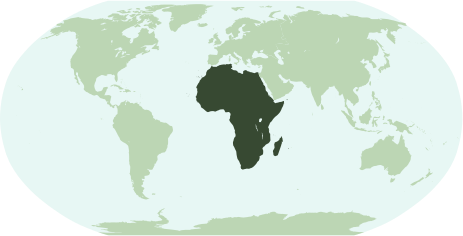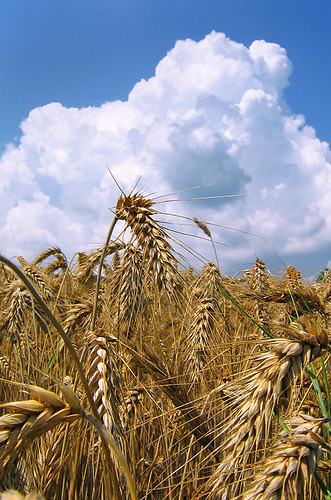África es un gran continente. Su masa terrestre cubre 31 millones de kilómetros cuadrados y representa un 20% de la tierra. Es el segundo del mundo en extensión y tiene una población de alrededor de 900 millones de personas, o sea que está menos poblado que la India y China.
África es una de las regiones más ricas en recursos naturales y diversidad cultural. La bendición de sus recursos naturales ha sido calificada de maldición, pero un recurso sólo puede convertirse en maldición por obra del ser humano. Los expertos en estadística sostienen que el 41% o más de los africanos vive con menos de 1 dólar por día. Nosotros, sin embargo, decimos que la calidad de la vida de una persona no está dada por la cantidad de dólares estadounidenses que tiene en el banco. ¡Nuestro medio ambiente es nuestra vida!
África es el centro del mundo. Es la cuna de la raza humana y conserva mucha de la humanidad que se ha perdido en tantos lugares del mundo. Su fuerza radica en su diversidad biológica y cultural y en su rico acervo de conocimientos y sabiduría. Este boletín despliega ante nuestros ojos las muchas y continuas agresiones que especuladores codiciosos, empresas extractivas transnacionales e instituciones financieras internacionales infligen al continente. Su diversidad debe ser defendida y protegida.
África estuvo una vez cubierta por exuberantes bosques tropicales y bañada por aguas limpias, y albergaba una enorme cantidad de especies, algunas de las cuales aún no están documentadas. La prolongada explotación indiscriminada ha provocado una deforestación masiva y el consiguiente desplazamiento de pueblos.
Años de colonialismo empujaron a los gobiernos africanos hacia la agricultura de plantación con el objetivo de proveer de materias primas a Europa y Norte América. La división internacional del trabajo requería que la mano de obra especializada estuviera en la metrópolis y el personal subalterno en las colonias, y, como resumió el erudito Walter Rodney en su libro “Cómo Europa subdesarrolló a África”: “la evidencia más convincente de la superficialidad de los comentarios acerca de que el colonialismo ‘modernizó’ a África, es que la gran mayoría de los africanos entraron al colonialismo con una azada y salieron de él con una azada.”
El colonialismo y las actuales relaciones neocolonialistas logran que las tierras que habrían servido para producir alimentos para el continente sean transformadas en plantaciones cuyos productos están destinados principalmente a la exportación. Las tierras que se usaban para la producción de mandioca, ñame y otros alimentos básicos locales, se convirtieron en plantaciones de té, caucho, palma aceitera, algodón, café, azúcar, cacao y maní. Hoy en día, enormes franjas de tierra están siendo convertidas en plantaciones de agrocombustibles, simplemente para alimentar las máquinas en el Norte y afianzar la situación de dependencia de los africanos. Irritantemente, algunas de nuestras tierras son etiquetadas como tierras marginales y reservadas para cultivos como la jatrofa. Esta clasificación de las tierras no es más que un artificio lingüístico para marginalizar y desplazar a las comunidades pobres en beneficio de los acaparadores de tierras.
El hecho de que África sea rica en recursos minerales ha engendrado conflictos graves y violentos. Estos conflictos no son sólo los que se manifiestan como guerras; hay varios casos más sobre los que hay poca información, que ocurren cuando operadores irresponsables de la industria extractiva surcan el continente arrebatando todo lo que pueden, dejando la tierra cubierta de cicatrices y a la gente en la miseria. Recordemos los conflictos recientes que pusieron a Liberia y Sierra Leona de rodillas, los conflictos que devastaron la región del Congo y la situación actual en los yacimientos petrolíferos del delta del Níger, en Nigeria.
Hablar del delta nos hace recordar la destrucción de los hermosos manglares que bordeaban las costas tropicales del continente, ofreciendo lugares aptos para el desove de varias especies acuáticas y protegiendo la tierra contra las olas devastadoras y la erosión costera. Hoy en día, las actividades de la industria petrolera y la cría industrial de camarones representan una grave amenaza.
El cambio climático es un tema de derechos humanos y así lo han reconocido las Naciones Unidas. Nadie discute el hecho de que es injusto que las naciones industrializadas continúen con sus enormes emisiones de carbono mientras sugieren acciones en los países menos industrializados de África y el resto del Sur para compensar su inacción en casa. La justicia exige que los países del Norte tomen medidas fuertes para contener las emisiones de carbono en su lugar de origen, y así dar pruebas de alguna seriedad para afrontar las manifestaciones reales de la crisis climática que amenaza la supervivencia de muchos pueblos y naciones.
Una de las fallas principales del protocolo de Kyoto es que no atribuyó en forma inequívoca a los hidrocarburos la culpa del problema. Por lo tanto, los planes para manejar el problema fueron fundamentalmente erróneos. La sabiduría popular nos enseña a atacar la raíz de los problemas y no sólo los síntomas, si lo que buscamos es resolverlos de manera radical y duradera. Un volumen enorme de emisiones de carbono no puede ser un signo de progreso y desarrollo.
El protocolo de Kyoto se basó en una ideología de mercado y esto ha bloqueado el camino hacia soluciones verdaderas y justas del cambio climático. Incluso el acuerdo alcanzado en Bali (diciembre de 2007) sobre Reducción de Emisiones por Deforestación y Degradación (REDD) gira en torno a esa misma ideología de mercado. Permite a los países del Norte financiar proyectos forestales utilizando los fondos de carbono del Banco Mundial y reclamar créditos de carbono que los autorizan a seguir contaminando en casa. El mecanismo REDD ya está encendiendo señales de alerta roja en todo el Sur, a medida que las comunidades ven con preocupación que los comerciantes de carbono y los especuladores tomarán el control de sus bosques y sus tierras, marginándolos de ese modo aún más y poniéndolos ante peores riesgos que los generados por el propio caos climático.
La marcha destructora de las empresas petroleras transnacionales de Oriente y Occidente debe ser detenida. Las huellas de estas empresas pueden verse en el Golfo de Guinea y emergen cada vez más en la costa este del continente; las empresas petroleras están implicadas en los violentos conflictos que se desarrollan en Sudán y en el resto del mundo. Las comunidades de África están comenzando a reclamar que se impida cualquier nuevo emprendimiento petrolífero en la región, porque al mundo le irá mejor si el carbono permanece bajo tierra. Contar con el petróleo como fuente de enriquecimiento y como fuente de energía para el futuro es vivir de ilusiones, dado que se trata de un recurso finito, que está disminuyendo y que ya no tiene porvenir alguno.
Les ofrecemos un plato africano rico en calorías, que seguramente los hará pensar y, quizás, solidarizarse con los valientes pueblos de este continente que defienden su patrimonio. ¡Que lo disfruten!
Puedes comentar este artículo en: http://wrmbulletin.wordpress.com/
Etiquetas: Africa, Calentamiento global, WRM





















 Photo courtesy National Renewable Energy LaboratoryGeothermal energy is poised to double in the United States, with 4,000 MW of capacity under construction." class="caption" align="" height="200" width="250">
Photo courtesy National Renewable Energy LaboratoryGeothermal energy is poised to double in the United States, with 4,000 MW of capacity under construction." class="caption" align="" height="200" width="250">

 In commenting on the war in the Caucasus, most American analysts have tended to see it as a throwback to the past: as a continuation of a centuries-old blood feud between Russians and Georgians, or, at best, as part of the unfinished business of the Cold War. Many have spoken of Russia’s desire to erase the national “humiliation” it experienced with the collapse of the Soviet Union 16 years ago, or to restore its historic “sphere of influence” over the lands to its South. But the conflict is more about the future than the past. It stems from an intense geopolitical contest over the flow of Caspian Sea energy to markets in the West.
In commenting on the war in the Caucasus, most American analysts have tended to see it as a throwback to the past: as a continuation of a centuries-old blood feud between Russians and Georgians, or, at best, as part of the unfinished business of the Cold War. Many have spoken of Russia’s desire to erase the national “humiliation” it experienced with the collapse of the Soviet Union 16 years ago, or to restore its historic “sphere of influence” over the lands to its South. But the conflict is more about the future than the past. It stems from an intense geopolitical contest over the flow of Caspian Sea energy to markets in the West. 